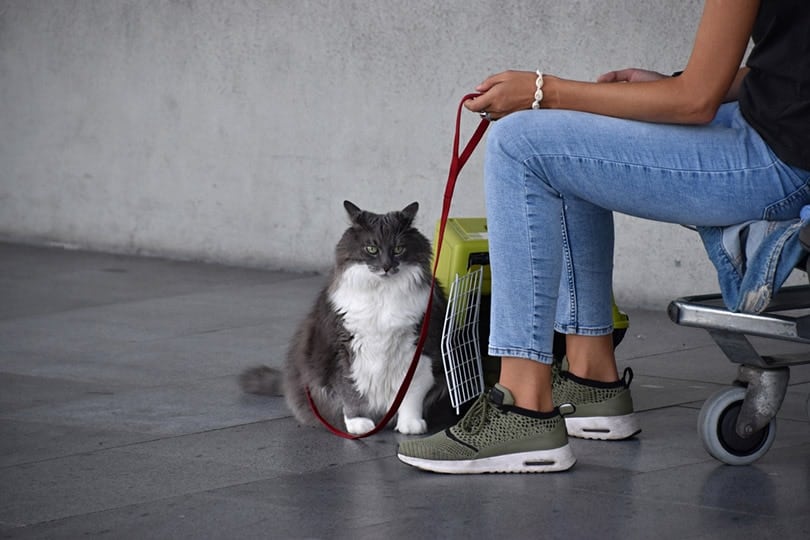There are few experiences more tragic than losing a pet. No cat owner desires to endure the heartbreak that comes with losing their beloved pet, but sadly, many do. Whether you have got experienced this grief or not, you’ll be able to work to forestall such losses in the long run by recognizing Lost Pet Prevention Month.
Lost Pet Prevention Month is observed through the month of July. Its purpose is to lift awareness of missing pets and forestall the lack of more animal companions. This campaign is a priceless a part of ensuring that our beloved cats don’t grow to be an element of a tragic statistic.
Why Was National Lost Pet Prevention Month Established?
Should you needed to guess what the busiest day of the 12 months for animal shelters was, what would you choose? It could seem strange to think that there may be at some point out of the 12 months that sees a consistent, massive increase in surrendered or stray animals, nevertheless it’s the reality.
In the USA, July fifth is the busiest day of the 12 months for animal shelters. It is basically since the loud celebrations of the Fourth of July can startle pets, causing them to flee at a moment’s notice.
As well as, families take more trips in the course of the summer. Pets which are taken along for the ride could also be stressed by their recent environment, causing them to run away. The frequency of lost pets during this month caught the eye of PetHub, a company dedicated to creating tools that track down missing pets.
In 2014, they launched the first-ever Lost Pet Prevention Month to spread awareness and forestall more pets from getting lost. Lost Pet Prevention Month helps inform and equip cat owners with resources to maintain their pets secure.
Image Credit: StockMediaSeller, Shutterstock
The Tragic Reality of Lost Cats
Annually, around 6.3 million animals are delivered to animal shelters nationwide. Out of this total, 3.2 million of them are cats. Many of the cats are strays, surrenders, and rescues. As a result of the immense flood of incoming cats, only 2.1 million are adopted annually. Other worrying statistics include:
- Out of 810,000 shelter animals returned to their owners, only 100,000 are cats.
- 530,000 cats are euthanized every year
- Twice as many animals are delivered to shelters as strays or lost pets in comparison with the variety of those surrendered by their owners
- Cats make up over half of euthanized animals in shelters every year.
The statistics are concerning to any animal lover, but especially to cat owners. To stop your loved one pet from becoming such a tragic statistic, you’ll be able to take motion to forestall your cat from becoming lost.
The best way to Prevent Your Cat From Getting Lost
There are many ways to maintain your cat secure. By checking off the next steps, you’ll be able to rest easier at night, knowing that your cat is unlikely to grow to be lost.
1. Keep Your Cat Indoors
There are a lot of advantages to creating your cat an indoor-only cat. First, the danger of physical dangers decreases significantly since they’re unlikely to come across wild animals, territorial cats and dogs, unkind humans, or cars. As well as, indoor cats are less prone to develop infectious diseases.
2. Put Collars and ID Tags on Your Cat
Even in case your cat is indoor-only, it’s best to have some type of identification in your cat, just in case. Cats might be sneaky escape artists after they need to be, so don’t rule out the potential of them slipping through the door. Cats with collars and ID tags might be easily returned home if found by a stranger.
Make certain that your cat’s ID tag has their name, your name, your address, and your telephone number. This ensures that whoever finds your cat can contact you and produce them home.
Image Credit: stockelements, Shutterstock
3. Microchip Your Cat
Pet owners must also have their cats microchipped. Microchips contain codes that might be read at vet offices or shelters, telling them who the cat belongs to. Just you should definitely have your cat’s microchip updated when you move!
4. Be Aware of Your Cat in Chaotic Environments
Cats can grow to be easily frazzled, especially when their house is overrun with chaos. If you have got visitors in your private home, your cat may feel threatened and bolt out the door. To stop that, plan ahead.
Keep your cat in a quiet, secure room where visitors is not going to enter. Depending on the length of the visit, give your cat toys, food, water, and a litter box to make sure all of their needs are met. It will reduce their stress and encourage them to remain right where they’re.
5. Ensure Your House is Secure
If there may be a way on your cat to flee your private home, they’ll find it. Make certain all windows and doors are securely latched. Your cat shouldn’t have the ability to push their way through.
Should you let your cat go outside, ensure they’re kept in an enclosed area with no technique of escape. This implies examining your fences or other barriers to be sure that there aren’t any weak points.
6. Use a Carrier or Leash When Leaving the Home
During vet appointments or other events that cause you to depart the house along with your cat, be prepared. Use a carrier or leash to move your cat to and from the house.
Image Credit: Helena Zezulkova, Shutterstock
7. Train Your Cat to Come When Called
Cats could also be independent and aloof, but that doesn’t mean they can’t be trained. By training your cat to return when called, you’ll be able to maintain higher control in the event that they begin to wander.
8. Have a Plan for Emergencies
Natural disasters can occur at a moment’s notice, so having a plan in place can keep you and your cat secure. Having animal first aid kits, feline travel supplies, and microchipping your cat are great ways to maintain them secure in an emergency.
Final Thoughts
No pet owner desires to experience the grief that comes with losing a beloved cat. That’s the reason Lost Pet Prevention Month exists; it provides pet owners with the resources needed to maintain their companions secure. When July rolls around, consider getting involved with Lost Pet Prevention Month by posting on social media or volunteering at your local animal shelter.
Featured Image Credit: StockMediaSeller, Shutterstock






